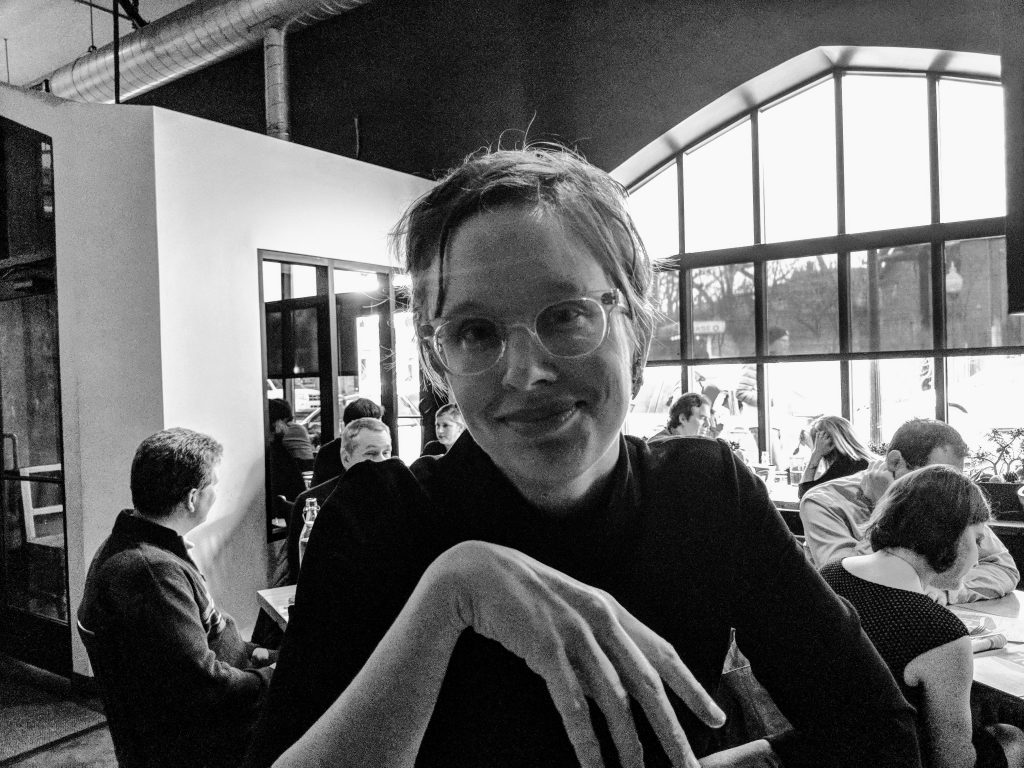
Jane Zwart teaches at Calvin University, where she also co-directs the Calvin Center for Faith & Writing. Her poems have appeared in Poetry, Ploughshares, Threepenny Review, The Poetry Review (UK), and TriQuarterly, as well as other journals and magazines.
Jane’s Poem, “Still Life With”, originally published in Basalt:
Still Life With There is nothing with which you can still life. Even so, the painter strives in his atelier to ransom hams from perishability and greater his art who can garnish the dish gone off with a blood-sozzled fly. Less stunning are the lobsters and fish in sequin sheaths and mundane is the unplucked duck that dangles on the wall. … There is nothing with which you can still life. Even the veriest vase in trompe-l’oeil is subject to cracks under lacquer as sure as silver ewers cloud and handmade goblets drip because sand-made glass is viscous, a deserter who waits and waits. … There is nothing with which you can still life. Even the twin halves of fruits ferment and peaches’ cheeks go weak as the jowls of a gran who takes her dentures out. Art cannot halt this lavish thing that pockmarks lemon peels. With life still so unsated and so corruptible, nothing, nothing can still it, shifty iridescent life.
Jane’s Poem, “Rarity”, originally published in The Shore:
Rarity
My sons, given crayon bins, mine for the rarities: cadmium
red and razzmatazz. Given a baseball diamond, they kneel
in a kibble of limestone, each sifting for chipped jewels,
each sure to come home with his fist of small stones, asking
to be told they are gems. Already they have learned to want
what is scarce.
Blame me.
I want to draw such afternoons
a corral of colored wax. I want to rake a moat around them,
to defend as an island this trove of gravel, this now.
Jane’s Poem, “I read that the moon is rusting”, originally published in Wilderness:
I read that the moon is rusting My son defines time--its river, not its measure-- as the way one event changes into another. I am letting what my son knows of time climb and turn a laddered wheel in my mind. I am letting the river run the mill that changes one kind of unknowing into another. . . . Once a student told me that her mother kept vases of flowers long past their prime. She thought them still beautiful, wizened tulips, their petals knuckling into pecans. . . . I read that the moon is rusting. Here on earth a breeze kicked up by passing cars fans a dead katydid. Invisible thumbs shuffle her wings’ gauzy underthings. . . . One event is turning into another. My son grows tall but is still young enough to trail a hand, offhandedly, in the current that carries him. There is so little we can demand from time but I would ask to be like a tulip, like a katydid, like the henna-chinned moon: one of those who, done or undone, changes next into another kind of wonder.
The following is an interview conducted by Superstition Review‘s Poetry Editor, Carolina Quintero, on April 27, 2021. It regards Jane’s poetry, looking specifically at both her process and inspirations.
Carolina Quintero: Hi, Jane! Thank you so much for agreeing to this interview with me. It was such a joy reading your poetry. You have such grace with your word choice and craft… Motherhood is a frequent theme in your work. How has your writing evolved through motherhood?
Jane Zwart: Early on, having kids meant I wrote fewer poems, but that was a matter of time and mental space, not any shortage of material. On the contrary, the raw material I found for poetry multiplied wildly when my boys were born. Of course it did. Babies are fragile enough that you can see the miracles pulsing under their skin and gripped in their tiny irrational hands. As for toddlers, they tutor you in the ways language works and breaks, its patterns and exceptions; in picking up syntax, they are full of defiance and delight, and that’s a good thing for a writer to steep in. So I did, when my boys were little, rake in so many gems. But most of them I had to store for those years, that season. Which is why I labeled a folder “poem crumbs” and stuffed it with notes, giving myself something to mine when they got bigger, more independent. I’ll add this: as Wendell (11) and Ambrose (7) grow older, I find whole lines of poetry in things they say. I borrow their wonder. And their tenderness toward the world heightens my tenderness toward the world.
CQ: Your poetry is dense with imagery and concise with word choice. What is your process like to achieve these traits in your work?
JZ: Well, thank you. The images come to me first, almost always, and I suppose that’s why the poems are, as you say, “dense with imagery.” Sometimes that density occurs collage-wise, through a bunch of images testing their angles and echoes against each other. But sometimes in a poem, a single image grows dense; the poem stuffs and coats the picture or object with so many hints and arguments. And this will sound foolish, but for me the process behind wielding imagery is looking and thinking. I owe my art history professors, Henry Luttikhuizen and Charles Young, a huge debt of gratitude for training me to do just that: to look and to think. I’m also indebted when it comes to word choice. To my parents, who filled our house with shelves and shelves of words. To other poets, who have sent me to the dictionary but who have also let me fall in love with perfectly ordinary words transfigured by their neighbors on the page. And to Roget.
CQ: What inspired you to write about time and its unpredictability?
JZ: The easiest way to answer this question would be to name writers I love who capture the way time snags, how the past and future breathe down the neck of the present, how history loops. I think of novelists first: Toni Morrison, W.G. Sebald, William Faulkner, Gabriel García Márquez, Virginia Woolf, David Mitchell. But of course the answer is also subjective, and for me it has to do with the awful mortality of all these people I love, the shortness of a life–which I hold in tension with the belief that our souls are not mortal but, rather, each breathed by God into the little husk of a self. I use poetry, then, to adjust my grasp on time. A poem slows time, a little, but it is also a way of loosening my grasp on the perishable world of people and things that I tend to hold too tightly. After all, to write something is to relinquish it as well as to preserve it.
CQ: What are your poetic influences as of late?
JZ: Amit Majmudar. All of his books–What He Did in Solitary is the most recent–have influenced me. Or at least I hope they have. Amit balances wit and weight so deftly; with him, “the work is play for mortal stakes,” as Frost put it. Amit, though, has also influenced me more directly–an immense kindness on his part. Over the past couple years, he and I have “mirror-written” a great deal, taking turns conjuring titles for which we both then improvise a poem, swapping them when time’s up. Put simply, Amit has taught me to write to fill in a given shape. Before, I always waited on the poem to sprout on its own. But there are many others, too. For instance, I love Catherine Pierce’s work so much that it borders on covetise. And her new book, Danger Days, has more or less converted my husband into reading contemporary poets to whom he is not married–no small feat. Who else? Well, Danusha Laméris’s Bonfire Opera is vivid and heartbreaking and heartmending, and having finished it, I still keep it in my bag for good company in long lines. And I return to Christian Wiman and Naomi Shihab Nye and Wisława Szymborska’s poems (Szymborksa’s in translation) again and again. Finally, I cannot wait to be further influenced by Kasey Jueds’s new book (I loved Keeper), Kaveh Akbar’s Pilgrim Bell, and W.S. Herbert’s Dear Specimen.
CQ: What advice would you give to young writers?
JZ: Read. Read the dead and the living. Read in translation. Read the work of writers who make you feel less lonely and of writers who feel like absolute strangers. Pay the world around you the sweetest, fiercest attention that you can, and take notes. Write. Write hoping that you outgrow your art again and again. Write as if you were unafraid. Write as if you were patient. Find your kin. Review books. Send fan mail. Register for the workshop. Attend the reading.
CQ: What are you currently working on in your writing?
JZ: I keep writing poems, and I keep writing book reviews. I keep trying to figure out where to prune for clarity’s sake and where to embellish for beauty’s. I’m also trying to find a publisher for my full-length manuscript. The odds are always so slender, of course, but perhaps this latest incarnation of the thing–which the brilliant poet W.S. Herbert reordered for me, schooling me in manuscript construction along the way–will be lucky. I do think a little luck is a must.




